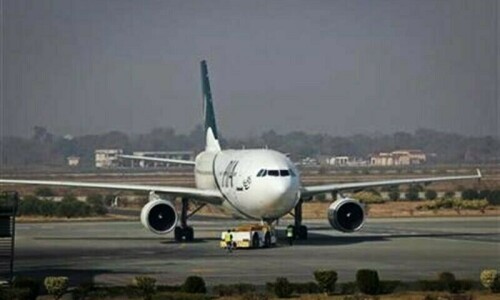 MORE and more people are being trapped in poverty owing to soaring food and oil prices, fragile macroeconomic conditions and mass displacements as a result of ongoing military operations against insurgency in different parts of the NWFP.
MORE and more people are being trapped in poverty owing to soaring food and oil prices, fragile macroeconomic conditions and mass displacements as a result of ongoing military operations against insurgency in different parts of the NWFP.
Wheat is the staple food of over 25 million people of the province with a consumption of around 3.412 million metric tones annually, 90 per cent of which is imported. The consumers are also vulnerable to market manipulation.
Punjab’s ban on inter-provincial movement of wheat and flour has caused great disparity in the prices of flour between the two provinces. For example, consumers in NWFP are paying Rs700-Rs750 for a 20-kg bag of wheat flour, which is selling for Rs300 in Punjab.
Surge in prices of other food items also has economic, social and cultural impacts on the everyday life.
A recent study suggests that households in NWFP have reduced food intake, changed its pattern and slashed down spending on wedding ceremonies and other social gatherings because of soaring prices of edibles.
A research on “Price hike and its impact on the household income” identifies the middle and lower-income groups have been widely hit.
The study carried out by the Regional Institute of Policy Research and Training (RIPORT), a Peshawar-based consultancy firm, says the prices of food items have increased by 32 per cent, whereas prices of non-food items including kerosene oil, petrol and diesel have surged by 120 per cent over the last six months.
“The low-income group with an average income of Rs8,000 a month is the worst hit by the rising food prices.
The people, the study says, are making both the ends meet by reducing consumption of food and non-food items, additional work and changing the food pattern. It indicates that 50 per cent of the households in the low-income group, 15 per cent in the low-middle income group, 50 per cent in the middle-income group and 35 per cent in the high-income group have reduced their food intake.
Likewise, 50 per cent of the households in the high-income group, 40 per cent each in the middle-income and low-middle income group and 20 per cent in the low income group are doing additional work.
The high cost of living is leading to dropout from schools, says the study. The people in the lowest income-group are taking their children out of schools and making them work to earn additional money.
Similarly, many have taken their children out of private schools and got them admitted in the public sector schools to save on heavy fees and other charges.
Dr Nasir Ali Khan, a Peshawar-based economist, says there is no doubt that food security has emerged as a major challenge in many developing economies, but in Pakistan and more specifically in the NWFP, rural households spend 60-80 per cent of their income on food.
“More important is the accessibility of food items. Food (especially wheat) is being imported but without safety nets for the poor, the situation would aggravate further,” he opines.
Farming also suffers from high cost of inputs. The small farmers have got used to hybrid varieties of crops which require high levels of chemical inputs besides water and will find it difficult to procure these inputs with their scarce resources.
The worsening law and order situation is going to make it difficult for lending institutions to remain engaged in business and finance small farmers to procure costly inputs.
Micro-finance for alleviating poverty has had little success in most areas of the province but even in areas where it had had some success, the security environment was adversely affecting its uptake.
A booming tourist business in Swat has been destroyed; the road connecting the provincial metropolis to the southern districts has been cut off many times because of the closure of the strategically located Kohat tunnel, adding to the price of goods in the market.
“Growing lawlessness in main cities and the neighbourhoods is going to make the few people willing to invest in these areas give up their businesses and migrate to other parts of the country,” says an official.
Around 70 per cent areas in the NWFP are affected by militancy, which has caused displacement of more than 800,000 people from settled and adjoining tribal areas. Similarly, threats to life and property are also haunting business people, many of whom are shutting down their businesses..
Haji Muhammad Asif, president of Sarhad Chamber of Commerce and Industry, says a majority of the big industrialists have invested in Dubai for a better and secure return.
“All of my family members, having different businesses in the province, want to move either to Dubai or Malaysia because of current tension,” informs another industrialist, requesting anonymity.
This situation will lead to unemployment in the province with the highest rate of unemployment. Its economy needs to grow at a rate of 7-8 per cent per annum to create additional employment of 1.2 million to cope with the unemployment which currently stands at 13 per cent.














































Dear visitor, the comments section is undergoing an overhaul and will return soon.